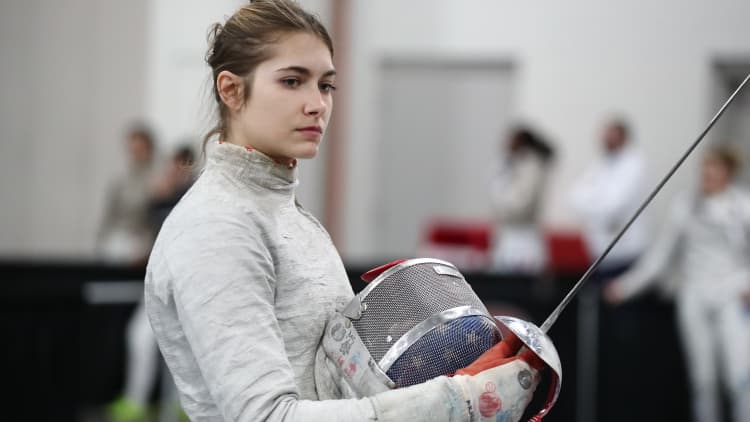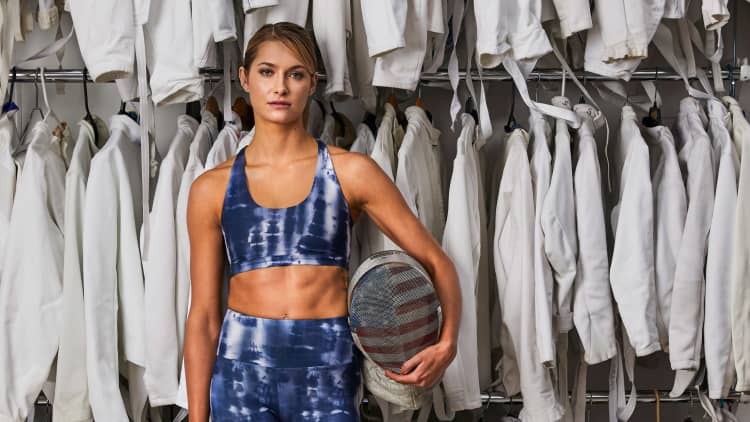Polish Prime Minister Mateusz Morawiecki announced Friday that Poland will be closing its borders for two weeks and banning all passenger flights for 14 days starting Sunday. This decree is an effort to get ahead of the deadly coronavirus in that country, which currently reports 64 cases and one death.
For U.S. Olympic hopeful Monica Aksamit, stranded in Poland, this announcement may shatter her dreams of heading to the Olympic Games in Tokyo this July.

The saber fencer, who had gone overseas to train, posted this Instagram on Friday: "I'm currently in Poland, after the recent speech of the Polish president, I may not be able to return back to the United States. My flight booked for Sunday was moved until Monday. ... I am currently sitting and worrying that I won't have a plane to board back home. ... My Olympic qualifying tournaments have been postponed, I've lost a few thousand dollars on this trip. But my biggest concern is returning back home. I'm still having a hard time believing that this isn't a horrible dream."
Despite growing concern that the coronavirus could force cancellation of the Olympic Games in July, Tokyo has repeatedly reaffirmed its commitment to holding the world's biggest multisports event. Yet for many U.S. athletes, COVID-19 isn't the only factor that may keep them from getting there. Pursuing their sport is a costly, full-time endeavor, leaving many struggling financially, as travel, training and competition expenses can run upward of $50,000.
According to four-time Olympian and certified financial planner Lauryn Williams, 80% of athletes who compete for Team USA struggle financially, she says.
Williams is a three-time Olympic medalist and the first American woman to earn a medal in both the Summer and Winter Olympic Games, for sprinting and bobsledding. She's also the founder of Worth Winning, a company that helps young professionals organize their finances.
"Olympic sports are not generally looked at as professional sports ... and not everyone who is training full-time is an NFL-style earner," Williams tells CNBC.
Unlike other countries, the United States is the only nation that does not provide federal financial support to its Olympic Committee. Instead, "the USOC depends solely on sponsors and the donations and [generosity] of others to bring dollars in and disperse those dollars accordingly to fund Team USA," says Williams.
As a result, many U.S. athletes are coming up with creative ways to meet their financial obligations — from taking up multiple jobs to launching GoFundMe pages, all while training to represent Team USA.
Crowdfunding her way to gold
Aksamit is expecting to hear any day now whether she's earned enough points to compete in the 2020 Summer Olympics in Tokyo, yet the saber fencer — a bronze medalist from the 2016 Games in Rio — knows there's much more at stake: With a rigorous, full-time training schedule that leaves her little time to get a steady-paying job, she somehow needs to come up with the hefty competition fees and travel expenses being an Olympian requires.
The amount of financial support athletes receive from the U.S. Olympic Committee varies by sport, but the total Aksamit says she receives from the USOC is $300 a month. That's approximately $75 a week, or $9.67 a day.
"In New York that doesn't even begin to cover groceries," the Brooklyn resident tells CNBC. (New York City's minimum wage is $15 an hour.)
In addition to the cost of food, many athletes must also foot the bill for things like training fees, gym memberships, equipment costs, coaching, transportation, competition travel, hotels, visas and registration fees.
"Training for the Olympics is very expensive. I mean, you're putting in countless hours, and there really aren't opportunities to have a full-time job," Aksamit says.
To support herself, the women's saber team medalist says she referees and coaches and picks up small modeling gigs here and there — that is, when her busy training schedule permits.
In an effort to resolve her budget woes, in September of 2019, Aksamit launched a GoFundMe page.
"The whole concept of crowdfunding was really difficult. ... I mean, it's a lot of pride that you have to swallow and ask people for help, but I literally was down to pennies."
Crowdsourcing helped the Olympian in a really big way: In just under six months, her page managed to raise nearly $31,000 — mostly from total strangers.
"Having [people] from all over the world give me their hard-earned money for me to go after my dreams — I mean, I broke down crying a few times over really nice messages," she explains. "And whenever I was struggling and I thought about giving up, I kind of always thought about that concept that these people believed in me and want to give me a chance. So that really helped a lot."
More from Invest in You:
Visa offers financial literacy to Olympic athletes
Sports and finance have a lot in common, says Olympian Lauryn Williams
The most important promotion a woman gets is the first one
Aksamit says she doesn't think she would have qualified for the Olympics if it wasn't for crowdfunding, because she wouldn't have been able to afford some of her biggest expenses, like travel to competitions and training camps.
When Acorns heard her story, the investment app surprised Aksamit during a training session with a $1,000 investment card for her future.
"If we did a lot more talking about it, Americans might put their dollars behind it, and then there would be more dollars to trickle down and help more athletes compete full-time," Williams explains.
Until then, Askamit says she'll continue to work toward her American dream, which is to take home both a team and individual medal in Tokyo.
"There's no way that I could be not training," Aksamit explains. "Any day that I'm not at practice, somebody else is getting ahead."
TUNE IN: The Tokyo Olympics begin July 24, 2020, on NBC.
Disclosure: CNBC's parent company, NBCUniversal, and Comcast Ventures are investors in Acorns.
Disclosure: CNBC parent NBCUniversal owns NBC Sports and NBC Olympics. NBC Olympics is the U.S. broadcast rights holder to all Summer and Winter Games through the year 2032.







